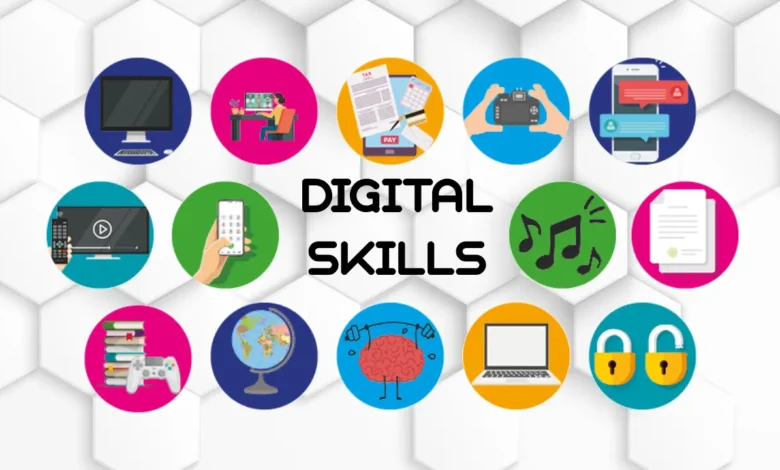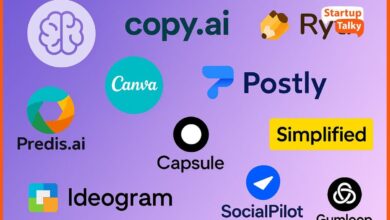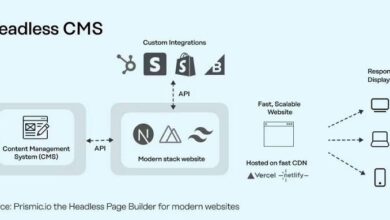The Most In-Demand Digital Skills in 2025

The future of work is digital, and staying ahead means understanding the most in-demand digital skills in 2025. The job market is changing faster than ever, driven by rapid technological advancements like artificial intelligence, cloud computing, and data analytics. Jobs that once required manual or traditional skills are now evolving to demand digital know-how. If you want to grow your career, secure your job, and adapt to tomorrow’s workplaces, knowing what digital skills will be hot in 2025 is crucial.
Why does this matter to you? Because digital skills are no longer optional, they’re essential. Whether you work in healthcare, finance, education, or business, technology plays a central role. By mastering these skills, you increase your employability, open doors to new opportunities, and position yourself as a valuable asset in any team or company.
This article will take you on a detailed journey through the top digital skills predicted to be most sought after in 2025. You’ll learn not only what these skills are but why they are important and how you can start acquiring them, even if you’re a complete beginner. By the end, you’ll be ready to embrace the digital world with confidence and enthusiasm.
Why Digital Skills Are More Important Than Ever in 2025
Before diving into the most in-demand skills, let’s quickly understand why digital skills are critical today.
The job market is evolving rapidly. Automation and artificial intelligence (AI) are transforming entire industries, from manufacturing to customer service, reshaping how work gets done. Global connectivity means businesses operate across borders, requiring digital tools for communication, marketing, and operations.
Almost every job now calls for some level of digital proficiency. You no longer need to be a tech expert in every role, but knowing basics like navigating software, understanding data, or communicating online is vital.
Most importantly, there’s a big gap between the skills employers need and the talent available. Advanced fields like AI, cybersecurity, and cloud computing face shortages of qualified professionals. This creates tremendous opportunity for those willing to upskill and fill these gaps.
Read Next: What Is “Generative Engine Optimization” — and Why Everyone’s Talking About It
The Most In-Demand Digital Skills in 2025
Let’s break down the key digital skills you should focus on, what they mean, and why they matter.
A. Artificial Intelligence (AI) & Machine Learning (ML)
What is it?: Artificial Intelligence (AI) is the technology that allows computers and machines to perform tasks that typically need human intelligence, such as solving problems, understanding language, recognizing objects in images, and making decisions. Machine Learning (ML) is a subset of AI focused on developing systems that can learn from data, recognize patterns, and improve over time without being specifically programmed for each task.
Why it’s important: AI is fast becoming an essential part of everyday life and work. It is behind voice assistants like Siri and Alexa, product recommendations on online stores, self-driving cars, smart medical diagnostics, chatbots that answer customer questions, fraud detection in banking, and much more. AI and ML increase efficiency, uncover new insights from large amounts of data, and open up possibilities that were not possible before. Businesses use AI-powered systems to automate repetitive tasks, analyze big data quickly, and deliver personalized experiences to users, helping them remain competitive in a fast-changing digital world.
Key roles and real-world applications:
- AI Engineers develop AI models that power tools like language translators, facial recognition, and virtual assistants.
- Machine Learning Specialists create algorithms that let computers learn to identify spam emails, recommend movies, or predict stock prices.
- Prompt Engineers design and optimize how we interact with complex AI systems (such as improving the prompts that get the best results from AI chatbots or content generators).
- AI Ethics Specialists focus on ensuring AI systems make fair, unbiased, and transparent decisions, protecting users from harm and maintaining trust in technology.
Opportunities and learning paths:
AI and ML are used in almost every sector: medicine (diagnosing diseases, predicting outbreaks), finance (automated trading, loan decisions), transportation (self-driving vehicles, traffic optimization), and retail (product suggestions, price optimization). To start in this field, you can learn programming languages like Python, study math foundations, and take beginner-friendly online courses in AI and ML concepts.
B. Data Science & Analytics
What is it?: Data Science is all about collecting vast amounts of information (data), cleaning and organizing it, analyzing it to find patterns or trends, and using these findings to make smarter decisions. Data Analytics refers to the process of examining raw data to draw conclusions. These fields combine computer science, statistics, mathematics, and business understanding.
Why it’s important: Companies rely on data for almost every important move they make. For example, businesses use data to understand what products customers like, how to price them, when and where to sell them, and even to spot problems before they become serious. Data-driven decision-making leads to better results in marketing, operations, customer service, finance, and beyond. The explosion of digital activity means more data than ever is being generated, and professionals who can turn this data into usable insights are in high demand.
Key roles and real-world applications:
- Data Scientists build complex models that predict sales trends, customer behavior, and risks for insurance or investments.
- Data Analysts sort through daily sales, social media feedback, and website statistics to identify what’s working and what’s not.
- Business Intelligence (BI) Developers design dashboards and reports that help management see the story the numbers are telling.
Opportunities and learning paths:
Data skills aren’t just for “numbers people”; even basic spreadsheet know-how (like Microsoft Excel or Google Sheets) is a start. As you advance, you’ll use specialized software like SQL, Power BI, Tableau, or programming languages like R and Python. Online courses, bootcamps, and even free tutorials can help you build foundational and advanced skills.
Read Next: Social Media in 2025: Top Platforms That Still Matter
C. Cybersecurity
What is it?: Cybersecurity is the practice of protecting computers, networks, software, and data from hackers, viruses, and other digital threats. It’s about keeping personal, corporate, and government information safe from unauthorized use or theft.
Why it’s important: As more activities move online, banking, shopping, healthcare, remote work, the risk and scope of cyberattacks continues to grow. Cybercriminals try to steal money, sensitive data, or disrupt systems for power or profit. A single security breach can cost a company millions, damage its reputation, and expose personal information. That’s why cybersecurity experts are essential for preventing attacks, detecting threats early, and responding quickly to fix problems.
Key roles and real-world applications:
- Cybersecurity Analysts constantly monitor systems and networks for unusual behavior, patching vulnerabilities before attackers exploit them.
- Ethical Hackers (Penetration Testers) are “good hackers” who try to break into systems to find weaknesses before the real bad guys do.
- Security Architects design the overall strategy and structure to protect organizations from ongoing cyber threats.
Opportunities and learning paths:
You can start with basic safe computing habits, then move into more technical skills, such as risk assessment, operating system security, network defense, and ethical hacking. Many online platforms offer beginner-friendly courses, and certifications like CompTIA Security+, CISSP, or Certified Ethical Hacker can boost your career prospects.
D. Cloud Computing
What is it?: Cloud computing lets companies and individuals use powerful computers (“servers”) located elsewhere and connected via the internet to store, process, and manage data and software. Instead of keeping data on local computers, businesses “rent” space and computing power from large cloud providers.
Why it’s important: Cloud services (like Amazon AWS, Microsoft Azure, and Google Cloud Platform) help businesses save money, avoid expensive hardware costs, and only pay for what they use. Cloud makes it easy to scale up quickly, supports remote and hybrid teamwork, and helps ensure business continuity if something goes wrong. Sensitive data can be protected more robustly, and employees can access work tools from anywhere in the world.
Key roles and real-world applications:
- Cloud Architects are responsible for designing complex solutions so companies can migrate their software, data, and services to the cloud.
- Cloud Engineers set up, deploy, and maintain cloud environments, ensuring everything is secure, efficient, and meets business needs.
- Specialists in AWS, Azure, or Google Cloud Platform have in-depth expertise in specific cloud technologies, helping companies leverage the strengths of their chosen provider.
Opportunities and learning paths:
Even understanding basic cloud concepts is valuable for many roles. Start by learning how cloud storage (like Google Drive or Dropbox) works, then progress to cloud platforms and services, including how to deploy simple web applications. Certifications (like AWS Certified Solutions Architect or Microsoft Azure Fundamentals) are highly valued.
E. Digital Marketing & E-commerce
What is it?: Digital marketing means promoting products and services online using tools like social media, search engines (Google), email, and websites. E-commerce is the buying and selling of goods or services over the internet.
Why it’s important: With billions of people online every day, websites, social feeds, and digital stores are often the first place customers learn about a brand or product. Good digital marketing targets the right people and builds strong relationships with customers. E-commerce lets businesses operate without physical stores, selling products to anyone, anywhere, at any time.
Key roles and real-world applications:
- SEO Specialists increase how often a website appears on Google or Bing, bringing in more visitors.
- Content Strategists plan and manage information, articles, videos, graphics, that a business uses to attract and engage people.
- Social Media Managers plan posts, respond to comments, and create a digital “voice” for the brand.
- E-commerce Managers run online stores, organize digital sales events, and analyze shopping data for business growth.
Opportunities and learning paths:
You can start with free tools like Google Analytics or by managing your own social media accounts. As you gain experience, you’ll use platforms like Facebook Business Manager, Shopify (for e-commerce), and advertising tools like Google Ads. Creativity, communication, and a willingness to try new strategies are crucial skills.
Read Next: The Ultimate SEO Checklist After Google Updates 2025
F. Web Development & UI/UX Design
What is it?: Web development is the work of building, maintaining, and improving websites and web applications. UI (User Interface) design focuses on the look and feel—how sites are laid out, colors, and buttons. UX (User Experience) design is about making websites easy, enjoyable, and useful for visitors.
Why it’s important: First impressions matter in the digital world. Companies need fast, modern, beautiful, and easy-to-use websites to attract and retain customers. A badly designed site frustrates users, causing them to leave and find alternatives. UI/UX professionals help ensure every click is easy and satisfying, and web developers make sure the technology works smoothly.
Key roles and real-world applications:
- Front-end Developers create what the user sees and interacts with, menus, forms, images, using languages like HTML, CSS, and JavaScript.
- Back-end Developers manage what happens behind the scenes, databases, server operations, website logic.
- Full-stack Developers are skilled in both front-end and back-end, able to build a complete web application from start to finish.
- UI Designers craft visually appealing layouts, icons, and navigation systems.
- UX Researchers study how people use websites or apps, gathering feedback to design better user experiences.
Opportunities and learning paths:
You can start with basic website builders (such as Wix or WordPress) or learn entry-level HTML and CSS. As you get more advanced, you’ll build interactive sites, study design principles, and practice prototyping tools like Figma or Adobe XD.
G. No-Code/Low-Code Development
What is it?: No-code/low-code development uses platforms that let you build digital solutions with little or no traditional coding. You can use drag-and-drop interfaces and easy configuration options to make apps, automate business processes, or set up dashboards.
Why it’s important: These powerful tools make it possible for non-technical employees to solve problems and automate tasks, cutting down on development time and costs. Businesses can quickly adapt to changes, launch new ideas, and allow more people to contribute to digital innovation.
Key roles and real-world applications:
- Citizen Developers (employees outside of IT) create custom apps to streamline their work.
- Business Analysts and Project Managers use automation tools (like Zapier, Microsoft Power Apps, Airtable) to connect software and automate repetitive processes.
Opportunities and learning paths:
You don’t need to know how to code to get started. Try building simple apps (like inventory trackers or feedback forms) using no-code platforms and gradually move into automating more complex workflows.
H. Automation & Robotics
What is it?: Automation is the use of technology to perform tasks without human help. Robotics extends this idea by building physical robots or virtual “bots” that can handle everything from industrial manufacturing to online customer support.
Why it’s important: Automation boosts productivity, reduces mistakes, and lets teams focus on creative and strategic tasks instead of repetitive chores. It’s being used in areas like factories (robot arms assembling products), offices (bots processing invoices or emails), and even homes (robot vacuums and smart assistants). Automation can also improve safety by taking on dangerous tasks.
Key roles and real-world applications:
- Automation Engineers create and maintain systems that handle repetitive office or industrial processes automatically.
- Robotics Engineers design, build, and operate robots in factories, warehouses, or hospitals.
- RPA (Robotic Process Automation) Developers build software robots that perform routine digital tasks, like moving data between software systems.
Opportunities and learning paths:
To start, you might use task automation tools like IFTTT or Zapier. Explore how robots work through online courses or kits, and if interested in coding, learn RPA tools like UiPath.
I. Blockchain & Web3
What is it?: Blockchain is a special kind of database that records information in a secure, transparent way, making it nearly impossible to alter without catching the change. Web3 describes a future vision of the internet where users have more control over their own data and digital identities, and applications (dApps) run on blockchain instead of traditional servers.
Why it’s important: Blockchain makes possible cryptocurrencies (like Bitcoin and Ethereum), digital ownership through NFTs (non-fungible tokens), and trustless financial transactions (DeFi). It cuts out the need for middlemen, increases security, and allows people everywhere to take part. Web3 could bring more user privacy, decentralized social networks, and new business models.
Key roles and real-world applications:
- Blockchain Developers create, deploy, and maintain decentralized applications, everything from finance to gaming.
- Smart Contract Developers write programs that run automatically on the blockchain (for example, releasing payment only when both parties fulfill a deal).
- Web3 Product Managers bring together developers and designers to build new types of apps and services.
Opportunities and learning paths:
You can learn about blockchain from free resources, then try beginner projects like minting an NFT or making a simple smart contract. Open-source communities and online bootcamps also offer learning opportunities.
Read Next: How to Start an Online Store with No Tech Skills in 2025
J. Digital Soft Skills
What is it?: Digital soft skills are personal abilities and attitudes, rather than technical know-how, that help you work and thrive in digital workplaces.
Why it’s important: Even with the best technical skills, employees also need to:
- Understand digital tools and adapt as they change.
- Communicate clearly with team members in online settings.
- Solve unexpected problems using logic and creativity.
- Learn quickly and stay motivated as the digital landscape evolves.
Examples of key soft skills:
- Critical Thinking & Problem Solving: Examine situations, weigh information, and make the right decisions—especially important when using new technologies or facing uncertainty.
- Adaptability & Continuous Learning: Be open-minded, flexible, and proactive about learning new tools, platforms, or ways of working.
- Collaboration & Communication: Work well in teams, present ideas clearly, and stay connected even in remote environments.
- Digital Literacy & Fluency: Comfortably use digital devices, apps, and online platforms as part of everyday routines.
Improving these skills means participating in online discussions, asking for feedback, and stepping up to lead or contribute ideas, even when it’s outside your comfort zone.
How to Acquire These In-Demand Skills
Updating your digital skills can seem daunting, but many accessible options exist:
- Online Courses & Certifications: Platforms like Coursera, edX, Udacity, and vendor certifications (Google, AWS) offer in-depth learning.
- Bootcamps: Intensive short-term programs that focus on practical skill-building in areas like coding and data science.
- Self-Study & Projects: Use free tutorials, build your own projects, and contribute to open-source software.
- Mentorship & Networking: Connect with experts and peers for guidance and opportunities.
- Practical Experience: Seek internships, freelance gigs, or volunteer work to build real-world skills.
Start small, keep consistent, and embrace learning as a lifelong process.
Read Next: Why Startups Should Use Headless CMS in 2025
Conclusion
Digital skills are no longer a bonus but a necessity in today’s and tomorrow’s workforce. From AI and data science to cybersecurity and digital marketing, mastering these areas opens incredible career possibilities. Importantly, success also depends on soft skills like adaptability and communication.
Take action today, explore courses, join communities, and start practicing. The effort you invest now will shape a future full of opportunity.
By investing in these in-demand digital skills, you’re not just preparing for the future; you’re actively shaping it.
Frequently Asked Questions
1. What are the easiest digital skills to learn for beginners?
Starting with digital marketing basics like social media management and SEO, or simple web development using no-code tools, can provide quick wins for beginners.
2. Will AI replace digital jobs by 2025?
AI will automate routine tasks but also create new jobs requiring oversight, ethics, and building AI systems. Human creativity and problem solving remain vital.
3. How long does it take to learn these digital skills?
Learning time varies: some skills like basic coding or no-code development can take weeks, while advanced skills like AI and cybersecurity may take months to years.
4. Are digital soft skills really necessary?
Yes. Technical skills alone are not enough; employers value your ability to think critically, adapt, collaborate, and communicate effectively in digital environments.



